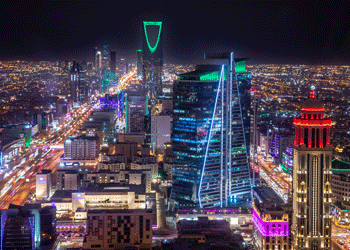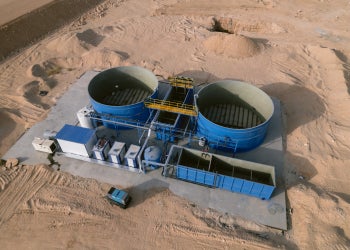Saudi oil and gas spending to surpass 2024 level
26 March 2025

When Saudi Arabia’s Energy Ministry directed Saudi Aramco in January 2024 to abandon its campaign to expand oil production spare capacity from 12 million barrels a day (b/d) to 13 million b/d by 2027, there were concerns that it would lead to a slow year for oil and gas project spending.
Indeed, as a consequence of that government decision, Aramco cancelled the tendering process for at least 15 contracts involving the engineering, procurement, construction and installation (EPCI) of structures at offshore oil and gas fields.
Since then, however, the Saudi energy giant has gone the other way. In its financial results for 2024, Aramco reported that it increased its capital investment last year to $53.3bn, which includes $50.4bn of organic capital expenditure (capex), marking a rise of 27% compared to 2023.
 Offshore spending
Offshore spending
The capex figure for 2024 includes an estimated $5bn that Aramco spent on EPCI contracts for maintenance, modification and upgrade of infrastructure at its offshore oil and gas fields.
Italian contractor Saipem was the biggest beneficiary of Aramco’s offshore spending, winning five of the eight Contracts Release and Purchase Orders (CRPOs) awarded last year.
In early May 2024, Aramco awarded Saipem the contract for CRPO 143, which involves replacing an oil line between the Berri and Manifa oil fields in the kingdom’s Gulf waters. Aramco then awarded Saipem the contract for CRPO 138, which involves laying a trunkline at the Abu Safah offshore field. The contract is estimated to be worth $500m.
The Milan-listed contractor then scooped three CRPOs in August, starting with CRPOs 132 and 139, the combined value of which is estimated to be about $1bn. In early September, Saipem began work on the two contracts, which involve the EPCI of structures to upgrade the Marjan, Zuluf and Safaniya offshore field developments.
Aramco also awarded the Italian contractor CRPO 127 in September. The $2bn contract involves the EPCI of topsides and jackets for wellhead platforms, a tie-in platform jacket and topside, rigid flowlines, submarine composite cables and fibre optic cables at the Marjan oil and gas field.
In late November, Aramco awarded three further CRPOs, worth more than $500m. China Offshore Oil Engineering Company won CRPOs 149 and 152, which are estimated to be valued at $30m and $250m-$300m, respectively. UK-based Subsea7 secured CRPO 153, which is understood to be valued at $200m-$250m.

Upstream increase
Saudi Aramco is expected to increase spending even further in 2025, based on its capital investment guidance in the range of $52bn-$58bn for 2025, excluding about $4bn of project financing.
It is anticipated that the majority of this capex budget will be allocated to upstream schemes, as Aramco is still responsible for maintaining Saudi Arabia’s spare oil production capacity at 12 million b/d. With Riyadh set to raise its oil production from April as part of a wider Opec+ plan, Aramco will be required to tap into its spare output capacity.
In its financial statement for 2024, Aramco said its spare capacity of 12 million b/d “provides flexibility to help meet potential oil demand growth”, adding that if necessary, using 1 million b/d of existing spare capacity could “generate an additional $12bn in operating cash flow, based on 2024’s average price” of $80.2 a barrel.
In addition, Amin Nasser, Aramco’s president and CEO, was quoted in the financial statement as saying that “global oil demand reached new highs in 2024, and we expect further growth in 2025”.
“With dependable and more sustainable energy key to global economic growth, we continue to make progress on projects to maintain our maximum sustainable crude oil capacity, expand our gas capabilities, achieve further integration of our upstream and downstream businesses to capture additional value, and help mitigate greenhouse gas emissions,” Nasser said.
Saudi Arabia’s offshore fields contain most of the kingdom’s hydrocarbons reserves and it has therefore been forecast that offshore EPCI projects will dominate Aramco’s upstream spending in 2025.
Aramco is in the bid evaluation and tendering stages for a total of 12 additional offshore tenders, including four CRPOs – numbers 145, 146, 147 and 148 – for work on the expansion of the Zuluf field development.
In December, contractors in Aramco’s Long-Term Agreement (LTA) pool of offshore service providers submitted bids for the four tenders, which are estimated to be worth a total of $6bn. The contract awards are due in the second quarter of this year.
LTA contractors also submitted bids in December for CRPO 150, a $350m-$400m tender involving the installation of structures at Aramco’s Northern Area Oil Operations.
Also in December, Aramco issued seven further CRPOs to its LTA pool of contractors. Bids for CRPOs 157, 158, 159 and 160 – relating to the EPCI of several structures at the Abu Safah, Berri, Manifa and Zuluf fields – are due to be submitted by 13 April.
CRPOs 154, 155 and 156 cover the next expansion phase of the Safaniya field. Offshore LTA contractors are due to submit bids for these three tenders by 31 July.
 Gas focus
Gas focus
In line with its aim of increasing gas production by 60% by 2030, with 2021 as its baseline, Aramco is on course to further advance its Jafurah unconventional gas production programme. Located in Saudi Arabia’s Eastern Province, the Jafurah basin holds the largest liquid-rich shale gas play in the Middle East, with an estimated 200 trillion cubic feet of gas in place. This shale play covers an area of 17,000 square kilometres.
The Jafurah project is a key component of Aramco’s long-term gas production strategy. The company expects the overall lifecycle investment at Jafurah to exceed $100bn.
In February 2020, Aramco received a capex grant of $110bn from the Saudi government for the long-term phased development of the Jafurah unconventional gas resource base.
Aramco is estimated to have spent a total of $25bn on three development phases of the Jafurah unconventional gas reserve. Most recently, in July 2024, a consortium of Spanish contractor Tecnicas Reunidas and China’s Sinopec Group was awarded a $2.24bn contract to perform engineering, procurement and construction (EPC) works on the third expansion phase.
The fourth Jafurah expansion phase is estimated to be valued at about $2.5bn. The main scope of work involves the EPC of three gas compression plants, each with a capacity of 200 million cubic feet a day (cf/d).
Bids for the fourth phase of Jafurah were submitted in mid-January and are being evaluated by Aramco, with the contract award due in the second quarter of 2025.
Looking ahead, Aramco is preparing to start the tendering process for the fifth Jafurah expansion phase later this year. The project, which is in the front-end engineering and design stage, is expected to add another 200 million cf/d of output capacity at the Jafurah master development.
MEED’s April 2025 report on Saudi Arabia also includes:
> DOWNSTREAM: Aramco’s recalibrated chemical goals reflect realism
> POWER: Saudi power sector enters busiest year
> WATER: Saudi water contracts set another annual record
> CONSTRUCTION: Reprioritisation underpins Saudi construction
> TRANSPORT: Riyadh pushes ahead with infrastructure development
> BANKING: Saudi banks work to keep pace with credit expansion
Exclusive from Meed
-
 Solar deals signal Saudi Arabia’s energy ambitions
Solar deals signal Saudi Arabia’s energy ambitions13 February 2026
-
 Saudi Arabia appoints new investment minister
Saudi Arabia appoints new investment minister13 February 2026
-
 Indian firm wins major Oman substation contract
Indian firm wins major Oman substation contract12 February 2026
-
 Developers appoint contractor for $500m wastewater treatment project
Developers appoint contractor for $500m wastewater treatment project12 February 2026
-
 Dewa raises Empower stake in $1.41bn deal
Dewa raises Empower stake in $1.41bn deal12 February 2026
All of this is only 1% of what MEED.com has to offer
Subscribe now and unlock all the 153,671 articles on MEED.com
- All the latest news, data, and market intelligence across MENA at your fingerprints
- First-hand updates and inside information on projects, clients and competitors that matter to you
- 20 years' archive of information, data, and news for you to access at your convenience
- Strategize to succeed and minimise risks with timely analysis of current and future market trends

Related Articles
-
 Solar deals signal Saudi Arabia’s energy ambitions
Solar deals signal Saudi Arabia’s energy ambitions13 February 2026
 Commentary
Commentary
Mark Dowdall
Power & water editorSaudi Arabia’s recent agreement to build $2bn-worth of solar power plants in Turkiye is the latest sign that the kingdom’s energy influence is changing.
Historically, this was measured in oil barrels and export volumes. Increasingly, this is extending to capital, structuring expertise and the ability to deliver record-low tariffs in competitive markets.
Announcing the deal, Turkish Energy Minister Alparslan Bayraktar said tariffs for the plants would be the country’s lowest on record, with electricity purchased under 25-year power purchase agreements.
It followed another announcement, in January, that Acwa is investing $200m to build a large-scale solar photovoltaic (PV) plant in the Philippines.
Whether Saudi-backed companies ultimately retain long-term stakes or primarily develop and build the assets, their role at the front end is significant.
Sponsors that bring sovereign backing, clear procurement processes and access to low-cost financing can influence tariffs and contract terms from the outset.
There is also a geopolitical layer. Investing in Turkiye, or anywhere for that matter, strengthens political and economic ties at a time when regional alignments are shifting.
Energy infrastructure is also long-term by its nature. It connects ministries, regulators, lenders and operators in relationships that often extend well beyond a single transaction.
Saudi Arabia has spent the past few years refining its approach to pricing, structuring and financing large-scale renewables at home.
Exporting that expertise may not rival oil in scale or visibility, but it does signal that Saudi Arabia is becoming more than just an energy supplier.
Increasingly, it is becoming a participant in how other countries design and finance their energy transitions. That influence is still significant.
https://image.digitalinsightresearch.in/uploads/NewsArticle/15645903/main.jpg -
 Saudi Arabia appoints new investment minister
Saudi Arabia appoints new investment minister13 February 2026
Register for MEED’s 14-day trial access
King Salman Bin Abdulaziz Al-Saud has made a series of senior government changes, including Khalid Al-Falih leaving his role as investment minister to become minister of state and a member of the cabinet.
Al-Falih has been replaced by Fahad Al-Saif as investment minister. Al-Saif has been head of the Investment Strategy and Economic Insights Division at the Public Investment Fund (PIF) since 2024. That role involved formulating PIF’s long-term investment strategy. He has also served as head of the Global Capital Finance Division, a role he has held since joining PIF in 2021.
The change of investment minister comes at a time when securing investments has become a key priority for Saudi Arabia as it prepares to hand over more projects to the private sector for delivery.
King Salman also named Abdullah Al-Maghlouth as vice-minister of media and Abdulmohsen Al-Mazyad as vice-minister of tourism. Khalid Al-Yousef was named attorney general, and Sheikh Ali Al-Ahaideb will serve as president of the Board of Grievances.
Faihan Al-Sahli was selected as director general of the General Directorate of Investigation, while Abdulaziz Al-Arifi was chosen to lead the National Development Fund. Haytham Al-Ohali will head the Communications, Space and Technology Commission, and Fawaz Al-Sahli will chair the Transport General Authority.
https://image.digitalinsightresearch.in/uploads/NewsArticle/15645415/main.gif -
 Indian firm wins major Oman substation contract
Indian firm wins major Oman substation contract12 February 2026

India’s Larsen & Toubro has won a contract to build the Majan 400/220/132kV grid station in Oman.
Estimated to cost $100m, the project includes an associated 400kV line-in line-out underground cable from Sohar Free Zone to the Sohar Interconnector Station.
The contract was awarded by Oman Electricity Transmission Company (OETC), part of the government-owned Nama Group.
The grid station will comprise eight 400kV gas-insulated switchgear (GIS) bays, eight 220kV GIS bays and 10 132kV GIS bays at the new Sohar Free Zone substation.
The scope includes the installation of two 500MVA, 400/220kV transformers and two 500MVA, 220/132kV transformers.
Local firm Monenco Consulting Engineers was appointed in April last year to provide design and supervision services for the project.
As MEED exclusively revealed, the main contract was tendered in June, as part of three significant contracts to build new substations in the sultanate.
The second contract, worth about $35m, covers the construction of the Sultan Haitham City 132/33kV grid station and associated 132kV line-in line-out underground cables running 4 kilometres from Mabella to Mabella Industrial Zone.
The third contract, valued at about $100m, covers the construction of the Surab 400/33kV grid station and an associated 400kV line-in line-out cable from the Duqm grid station to the Mahout grid station.
Local firms Muscat Engineering Consulting and Hamed Engineering Services are consultants for the Sultan Haitham City and Surab projects, respectively.
The two remaining contracts are currently under bid evaluation, with awards expected this quarter.
https://image.digitalinsightresearch.in/uploads/NewsArticle/15638107/main.jpg -
 Developers appoint contractor for $500m wastewater treatment project
Developers appoint contractor for $500m wastewater treatment project12 February 2026

Register for MEED’s 14-day trial access
Egypt’s Orascom Construction has won the engineering, procurement and construction (EPC) contract for a major wastewater treatment project in Saudi Arabia’s Eastern Province.
A consortium of Saudi utilities provider Marafiq, the regional business of France’s Veolia and Bahrain/Saudi Arabia-based Lamar Holding is developing the $500m (SR1.875bn) industrial wastewater treatment plant (IWWTP) in Jubail Industrial City 2.
Sources close to the project confirmed the appointment to MEED, adding that the project has now entered the construction phase.
Industry sources also said that financial close on the project is expected to be reached in the coming days.
In September, the developer consortium was awarded a contract, under a 30-year concession agreement, by Saudi Aramco Total Refining & Petrochemical Company (Satorp), a joint venture of Saudi Aramco and France’s TotalEnergies.
The planned facility will treat and recycle wastewater from Satorp’s under-construction Amiral chemical derivatives complex, also in Jubail.
Marafiq, formally Power & Water Utility Company for Jubail and Yanbu, will own a 40% stake in the dedicated project company. Veolia Middle East SAS will hold a 35% stake, and Lamar Holding’s Lamar Arabia for Energy will hold the other 25%.
The planned IWWTP, which will primarily serve the $11bn sprawling Amiral chemicals zone, will implement advanced water treatment and recovery technologies to process complex industrial effluents, including spent caustic streams. Treated water will be reintegrated into the industrial processes, supporting closed-loop reuse and energy efficiency.
The project follows a concession-style model, akin to a public-private partnership (PPP), where the developer consortium invests in, builds and operates the wastewater plant over a 30-year period, with returns linked to service delivery.
Marafiq has been involved in several similar projects across Saudi Arabia, including as the sole owner of the Jubail industrial water treatment plant (IWTP8), which treats complex industrial effluents for petrochemical and heavy industrial companies.
In 2020, Saudi Services for Electro Mechanic Works was awarded the $202m main contract for the fourth expansion phase of IWTP8. Construction works on the project are expected to be completed by the end of the quarter.
 READ THE FEBRUARY 2026 MEED BUSINESS REVIEW – click here to view PDF
READ THE FEBRUARY 2026 MEED BUSINESS REVIEW – click here to view PDFSpending on oil and gas production surges; Doha’s efforts support extraordinary growth in 2026; Water sector regains momentum in 2025.
Distributed to senior decision-makers in the region and around the world, the February 2026 edition of MEED Business Review includes:
> AGENDA: Mena upstream spending set to soar> INDUSTRY REPORT: MEED's GCC water developer ranking> INDUSTRY REPORT: Pipeline boom lifts Mena water awards> MARKET FOCUS: Qatar’s strategy falls into place> CURRENT AFFAIRS: Iran protests elevate regional uncertainty> CONTRACT AWARDS: Contract awards decline in 2025> LEADERSHIP: Tomorrow’s communities must heal us, not just house us> INTERVIEW: AtkinsRealis on building faster> LEADERSHIP: Energy security starts with rethinking wasteTo see previous issues of MEED Business Review, please click herehttps://image.digitalinsightresearch.in/uploads/NewsArticle/15637523/main.jpg -
 Dewa raises Empower stake in $1.41bn deal
Dewa raises Empower stake in $1.41bn deal12 February 2026
Dubai Electricity & Water Authority (Dewa) has announced it has increased its stake in Emirates Central Cooling Systems Corporation (Empower) from 56% to 80%.
The transaction was completed through the purchase of 2.4 billion shares and the transfer of the entire ownership of Emirates Power Investment (EPI), which is wholly owned by Dubai Holding.
The total value of the deal is AED5.184bn ($1.41bn).
Empower currently holds over 80% of Dubai’s district cooling market and operates 88 district cooling plants across the emirate.
According to MEED Projects, the UAE’s district cooling sector currently has nine projects worth $1.29bn in the pre-execution phase.
Empower has ownership in four of these projects, which have a combined value of $472m.
This includes a $200 million district cooling plant at Dubai Science Park, with a total capacity of 47,000 refrigeration tonnes serving 80 buildings.
Empower signed a contract to design the plant last August, with construction scheduled to begin by the end of the first quarter of 2026.
The utility is also building a district cooling plant at Dubai Internet City.
UAE-based TMF Euro Foundations was recently appointed as the enabling and piling subcontractor for the project.
https://image.digitalinsightresearch.in/uploads/NewsArticle/15635949/main.jpg


